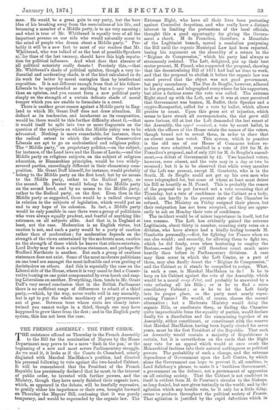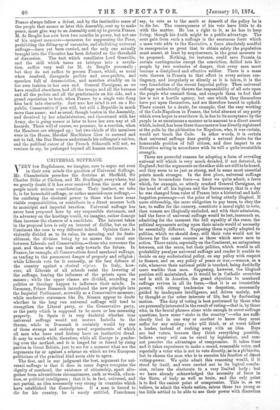THE FRENCH ASSEMBLY: THE FIRST CHECK.
THE resistance offered on Thursday in the French Assembly to the Bill for the nomination of Mayors by the Home Department may prove to be a mere flash in the pan,' or the beginning of a new and most severe Parliamentary struggle. As 7e read it, it looks as if the Comte de Chambord, utterly disgusted with Marshal MacMahon's position, had directed his personal following to vote against the two-headed Cabinet. It will be remembered that the President of the French Republic has persistently declared that he must, in the interest of public order, be invested with further powers, and the Ministry, though they have nearly finished their organic laws, which, as appeared in the debate, will be fearfully repressive, to gratify either his impatience or their own, brought forward on Thursday the Mayors' Bill, confessing that it was purely temporary, and would be superseded by the organic law. The Extreme Right, who have all their lives been protesting against Centralist despotism, and who really have a distinct interest in limiting the pretensions of the local officials, thought this a good opportunity for giving the Govern- ment a check. M de Franclieu, therefore, a Mameluke of the Legitimist branch, moved a resolution postponing the Bill until the organic Municipal Law had been reported, basing his argument on the absurdity of a return to the "Regime de Compression," which his party had always so strenuously resisted. The Left, delighted, put up their best orator present, M. Picard, who supported the proposal, showing that the decentralising Bill of 1871 had had no time to work, and that the proposal to abolish it before the organic law was voted proved that the object was not good government, but party ascendancy. The Due de Broglie, however, adhered to his proposal, and telegraphed everywhere for his supporters, but after a furious scene the vote was called. The extreme Right stood up with the Left, and as it was at once perceived that Government was beaten, M. Buffet, their Speaker and a crypto-Bonapartist, called for a vote by ballot, which allows proxies to count. Upon this gross act of injustice, which seems to have struck all correspondents, the riot grew still more furious, till at last the Lift demanded the last resort of the Assembly, the appel nominal, a vote by secret ballot, in which the officers of the House retain the names of the voters, though bound not to reveal them, in order to show that no absent man has voted. This system, which in practice is the old one of oar House of Commons before re- porters were admitted, resulted in a vote of 268 for M. de Franclieu's proposal, and of only 226 for M. de Broglie's amend- ment,—a defeat of Government by 42. Two hundred voters, however, were absent, and the vote may in a day or two be reversed ; but it is to be observed that while every member of the Left was present, except M. Gambetta, who is in the South, M. de Broglie could not get up his own men who were telegraphed for, but some of whom at least must detest his Bill as heartily as M. Picard. This is probably the reason of the proposal to put forward not a vote reversing that of Thursday, but a vote of confidence in the Cabinet as a body, which can hardly in the present state of the Chamber be refused. The Ministry on Friday resigned their places, but their resignation has not been accepted, and they are appar- ently to ask on Monday their vote of confidence.
The incident would be of minor importance in itself, but for two reasons. The Left has evidently gained the extreme Legitimists, about thirty in number, counting sixty votes on a division, who have always had a kindly feeling towards M. Gambetta personally,—first, for fighting for France when no one else would ; and secondly, for allowing them to fight too, which he did freely, even when hesitating to employ the Bretons,—and the party will therefore count much more heavily than before in Parliamentary divisions. A case may then occur in which the Left Centre, or a part of them, may also finally desert the "Regime de Compression," and the Cabinet as it stands be compelled to resign. What, in such a case, is Marshal MacMahon to do ? Is he to keep on his Cabinet against the vote of the Assembly, which would be a moral coup d'e'tat, and probably be answered by a vote refusing all his Bills ; or is he to find a more conciliatory Cabinet ; or is he to let the Left fairly into its proper place, as the party most nearly repre- senting France ? He would, of course, choose the second alternative ; but a Moderate Ministry would delay the organic Bills, or ameliorate them, or finding the Chamber quite impracticable from the equality of parties, would declare finally for a dissolution and the summoning together of an Assembly, either constituent, or constituent with the reserve that Marshal MacMahon, having been legally elected for seven years, must be the first President of the Republic. That such an Assembly would contain a majority of Republicans is certain, but it is nevertheless on the cards that the Right may vote for an appeal which would at once crush the Monarchical factions into their natural nothingness as political powers. The probability of such a change, and the extreme dependence of Government upon the Left Centre, by which alone the Government can hope to prevent it, all combine, in Lord Salisbury's phrase, to make it a toothless Government,' a government on the defence, not a government of aggression on all existing society. That the Cabinet is not confident in itself is evident from M. de Fourtou's circular to the Bishops, so long denied, but now given textually to the world; and by the agitation which any hostile vote, be it only for a little delay, seems to produce throughout the political society of France. That agitation is justified by the rapid defections which in
France always follow a defeat, and by the instinctive sense of the people that sooner or later this Assembly, sent up to make peace, must give way to an Assembly sent up to govern France. M. de Broglie has now been two months in power, but not one of his urgent measures—measures for suppressing the Press, prohibiting the filling-up of vacancies, and abolishing universal suffrage—have yet been carried, and the only one actually brought into the Chamber has been defeated on the threshold of discussion. The tact which conciliates Lord Granville, and the skill which turns an intrigue into a revolu- tion, suffice very well for M. de Broglie personally ; but they do not suffice to govern France, which, as usual when resolved, disregards prefets and sous-prefets, and speeches full of denunciation, and marches steadily on in her own fashion to her own end. General Cavaignac, as we have recalled elsewhere, had all the troops and all the bureaus and all the prefets and all the gendarmerie on his side, and a grand reputation to boot, when France by a single vote flung him back into obscurity. Just now her mind is set on a Re- public, Conservative if you will, but still a Republic in much more than name; and as usual, though beaten in the Assembly, and deceived by her administrators, and threatened with her Army, she is going sooner or later to have her own way at all hazards. There will of course, we presume, be a reaction, when the Members are whipped up ; but two-thirds of the members were in the House, Marshal MacMahon likes to succeed and not to fail, the Due Decazes understands his colleague's calibre, and the political career of the French Sidmouth will not, we venture to say, be prolonged beyond all human endurance.



































 Previous page
Previous page